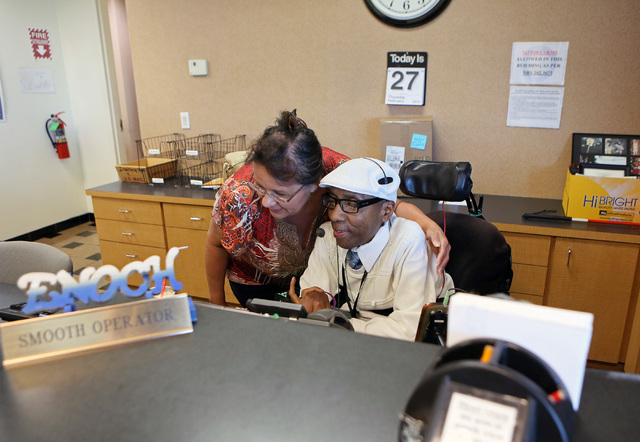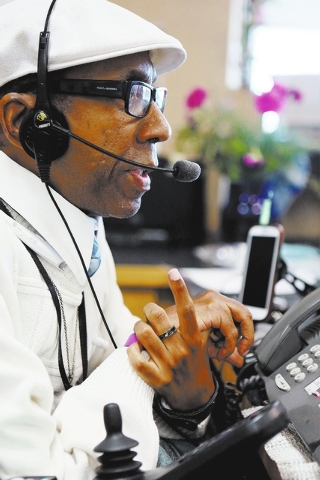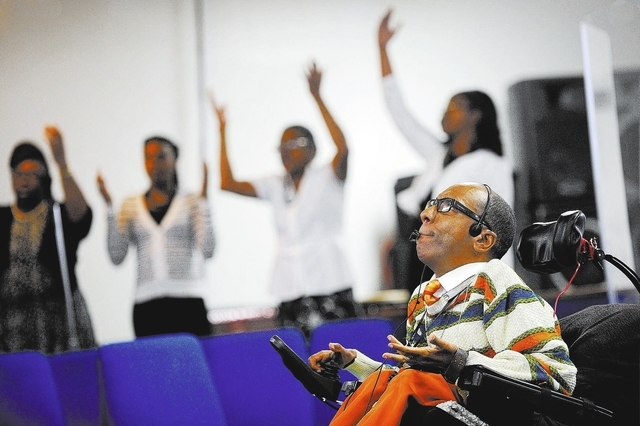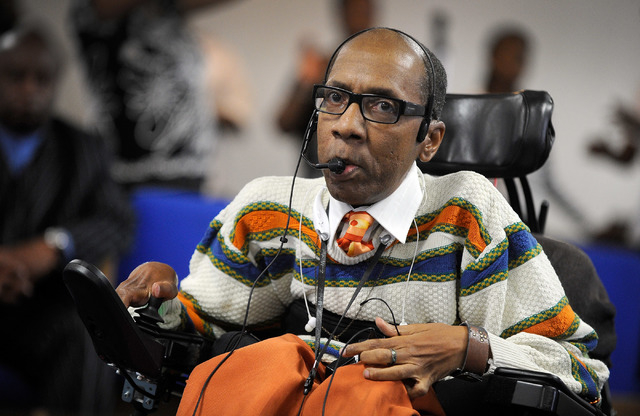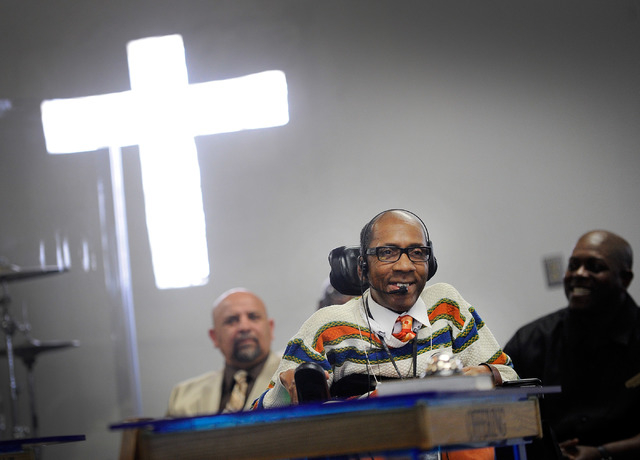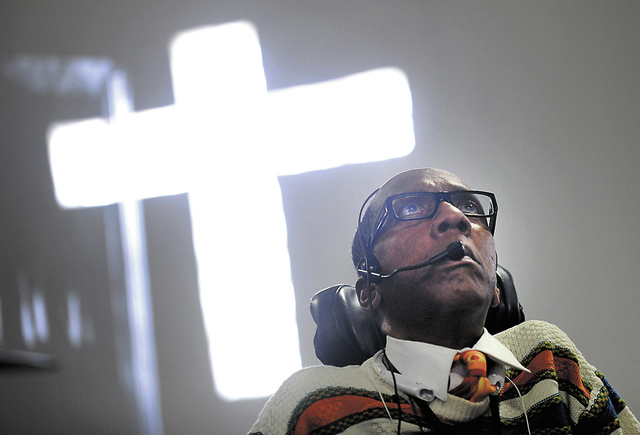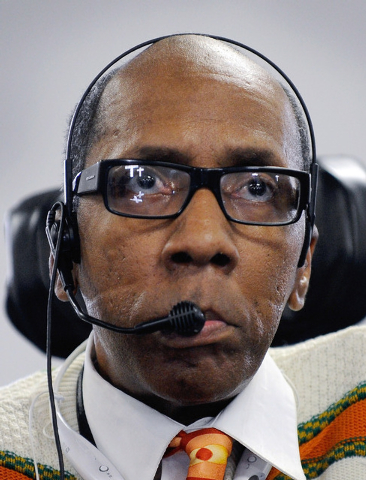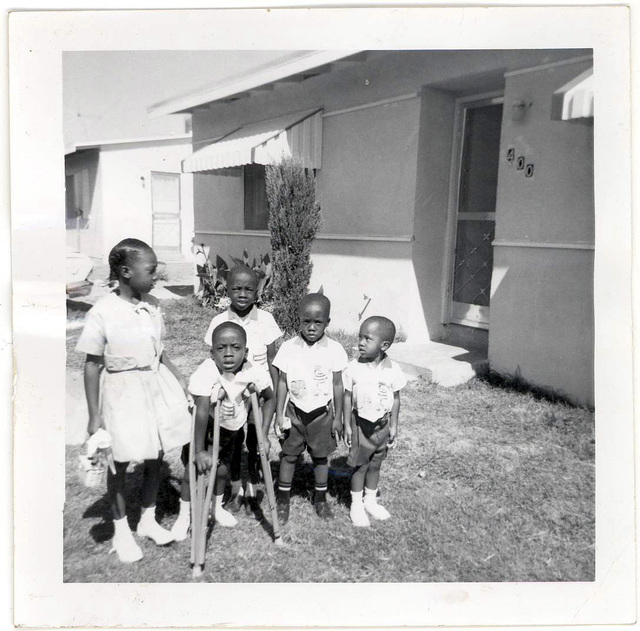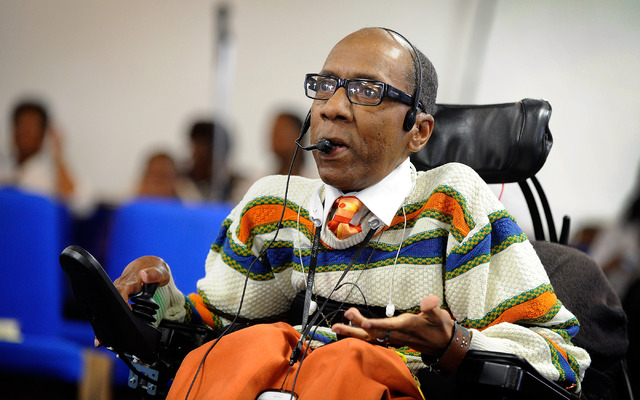Muscular dystrophy wracks local man’s body, but not his soul
Enoch Henry, about a year out from a stroke and battling prostate cancer, has felt the end coming in so many ways.
Too often he awakened exhausted, as if something disturbed but not quite awakened him.
During the day, as he worked the front desk and switchboard from his wheelchair inside a Bureau of Vocational Rehabilitation office, pain flared in his back, sides and hip — deep stinging sensations almost like insect bites that graduated into throbbing, dull aches.
His pulse seemed to vibrate throughout his body. He could almost hear his blood coursing through his veins and often could actually hear it pounding in his ears. Sometimes he felt he couldn’t catch a breath, and he was sure people could hear hoarse, ragged breathing as he tried to help people over the phone.
It seemed that each week his food had to be cut into smaller pieces so he could swallow it.
“I’ve felt myself getting weaker and weaker — I feel like my days are numbered,” the 55-year-old Henry said. “That’s why I’m retiring. I don’t want to die here. And I sure don’t want to be irritable and short-tempered with people because I don’t feel good.
“Many of the people I talk with are depressed because of their disability, and I need to be upbeat, make them feel better.”
It’s late February, two days before Henry left the job he’s held for the past 21 years. Born with muscular dystrophy, a disease characterized by progressive weakness
and degeneration of the skeletal muscles that control movement, he’s been known here as the guy who makes everyone feel better, a living symbol of playing the cards you’re dealt in life with gusto.
As Kim Cantieno, a supervisor in the state and federally funded rehabilitation program that helps people with disabilities become employed, finished some paperwork, she smiled as she went down memory lane.
“Enoch’s always been focused on doing good,” she said. “He’s the first person people see when they come up here. What a role model. He’ll greet someone who may be really down about a disability with a, ‘Hey, how are you on this beautiful day.’ And then give that a singing, soulful rendition. It lifts them up. He’s always upbeat. If he senses I’m having a bad day, he’ll sing to me over the phone, probably something from the Temptations or Isley Brothers. We’re going to miss him.”
Humming “My Girl” after lunch as he steered his electric wheelchair behind a partition in the office lobby, Henry parked behind a wooden nameplate engraved with the words “Smooth Operator. ” He made sure his telephone headset, worn above the kind of cap favored by golfers in the Ben Hogan era, was in position.
A phone call came in. Henry, unable now to move much more than his head, mouth and a few fingers, tapped the call in. Smiling, he sounded like a disc jockey from the ’70s on a soul/gospel station. No way you’d know he was hurting.
“You’re sure that’s all you need? … My Lord. ... My, my, my. … Beautiful day, isn’t it? … All right now, I’ll put you through.”
With his light blue tie, white shirt, white sweater and baby blue pants, the man who many doctors predicted would be dead as a child looked like he was pulled out of the pages of “The Great Gatsby.”
Gary Waddell, the former Channel 8 anchorman who hosted the Las Vegas portion of the Jerry Lewis Labor Day Muscular Dystrophy Telethon for around 20 years, said he’ll always remember Henry — a frequent guest on the show both as one of Jerry’s Kids and later as an adult — “as dressed to the nines, color-coordinated, sharp, like he was going out on the town.”
Another call came in. Henry listened briefly.
“Well, well, well, ” he said with a broad grin. “This is your lucky day. I know just the person here who’ll give you the help you need. … I’m sorry things aren’t going so well, but they will. You’re blessed. We’re all blessed. We’re alive.”
A man of faith
A March Sunday morning at New Light Missionary Baptist Church, the West Las Vegas church where Henry’s father, the late John Henry, pastored until his death in the ’90s. Now an associate minister here, the proud preacher’s son wore a white, orange and black sweater, orange pants, orange tie, black and white shoes and a headset microphone.
At one point, just as the gospel music began, Henry leaned as far back as his body would allow — an operation for scoliosis as a teen that left him in body casts for almost a year helped but could not rid him of a severe curvature in his spine. Softly at first, and then almost shouting, he chanted toward heaven: “Thank you, Jesus. Thank you, Jesus. Thank you, Jesus.”
“Hallelujah!” shouted the choir and other churchgoers.
The music from the keyboards, drummer and guitarist had Henry’s head bopping. As the song grew louder, he repeatedly spun in his wheelchair and delivered rhythmic staccato bursts of “Come on,” “Come on, Holy Ghost,” “We’re gonna have a good time.”
Before the service on “spiritual spring cleaning,” pastor Adam Addison said Henry, who says the Lord saved him from crack cocaine addiction in 1986, is living proof that faith can help you overcome any challenge.
The music ended as Henry started to speak to the congregation:
“Usually when we finish cleaning our own homes, we look around and say that we’ll never let the clutter pile up that high again. We should do the same for our spiritual house. Determine not to let it get that dirty again. The only way to accomplish this is to keep it up daily by feasting on God’s word and being sensitive to the Holy Spirit to work in our lives.”
“Amen,” the worshipers intoned.
‘a very brave man’
Dr. Seema Anjum, Henry’s physician, marvels at his ability to not only survive a number of medical conditions that have frequently put his life at risk, but also his drive to make a contribution to society and enjoy the life he has.
“He is a very brave man,” she said. “He has the best attitude despite all his medical complications.”
Muscular dystrophy, which affects the muscles that help support and stabilize the spine, produced his scoliosis, in which severe twisting of the spine causes the ribs to press against his lungs, restricting his breathing and reducing oxygen levels.
“His lungs are squished,” Anjum said, explaining why Henry has frequent bouts with pneumonia and other lung affections. “He doesn’t have much breathing capacity. … He has no muscle mass.”
Anjum said Henry, whose muscular dystrophy has also often resulted in urine infections, couldn’t tolerate surgery for prostate cancer, so she hopes the disease continues to be slow-growing.
“It’s hard for him to tolerate anything right now,” she said.
As he sat at the kitchen table in his tidy apartment recently — a personal care assistant comes by three times a day to help him with meals, hygiene and dressing — Henry showed a rare flash of anger. A barely touched lunch sat in front of him.
“When I had a kidney stone operation, they messed up somehow when they put a tube down my throat and now my jaw won’t open all the way,” he said. “It makes it hard to eat, talk or sing.”
The anger passed quickly and Henry laughed as he took out a photo album with pictures that show him on crutches and standing by a wheelchair as a little boy.
“My parents never treated me as disabled,” he said. “I’d get a whipping just like my brothers. I wanted so bad to walk and run like everybody else. I was strong enough then to be on crutches and to pull myself up so I could stand by my wheelchair. I didn’t want pictures of me in a wheelchair.”
Henry shook his head. “Now I’m not strong enough to dress myself, clean myself or feed myself. See how my food has to be cut up like a baby? I almost don’t have the muscles to swallow.”
The talk about what he can’t do today spurred Henry into remembering what he used to do, what he wants to do.
At the Variety School for the disabled in Las Vegas, which he attended throughout his youth, he loved playing wheelchair basketball with a rolled up sock and a wastebasket.
“That was so much fun,” he said.
He’ll never forget a trip to visit with Jerry Lewis in New York City.
“He and his wife were so nice to us and the city was so big,” he said. “He really cared about those of us who had muscular dystrophy. I wish he and MDA (the Muscular Dystrophy Association) got along. I think Mr. Lewis was done wrong.”
(In 2011, after Lewis’ telethon raised more than $2 billion for muscular dystrophy research after 45 years on the air, he and the MDA parted ways. Why it happened is still unknown, and Lewis wouldn’t comment for this piece.)
Before he worked at vocational rehabilitation, Henry worked at the Thomas &Mack Center, helping disabled people find their seating areas, and at the Department of Motor Vehicles, calling out numbers.
“I hope I can go back to the Thomas &Mack part time,” he said. “I love the people and the shows and basketball.”
A divorced father of three — the children he helps support live with their mother — Henry lives alone near Santa Fe Station. With traveling around town to visit people limited by the scheduling of paratransit and no longer seeing friends at work, the impact of the recent death of the service dog he had for 17 years has hit him hard.
“I really miss King around here,” he said. “I’m raising the $1,500 I need to get another trained dog soon.”
He prays retirement will turn out the way he dreamed it would. He wants to shop for clothes in Santee Alley in the Los Angeles fashion district and once again visit Ogden, Utah, where he said he “once saw some of the most beautiful mountains and met some of the friendliest people in the world.”
And most of all, he wants to go on a cruise for the first time — from California to Mexico.
“I want to be out there at night on the water with God and nature, where there’s no streetlights, no car horns, no interruptions, no Las Vegas dust. I want to count the stars. I want to look up at heaven with stars all around and thank God for all he’s done for me. Man, that would be beautiful.”
Contact reporter Paul Harasim at pharasim@reviewjournal.com or 702-387-2908.



